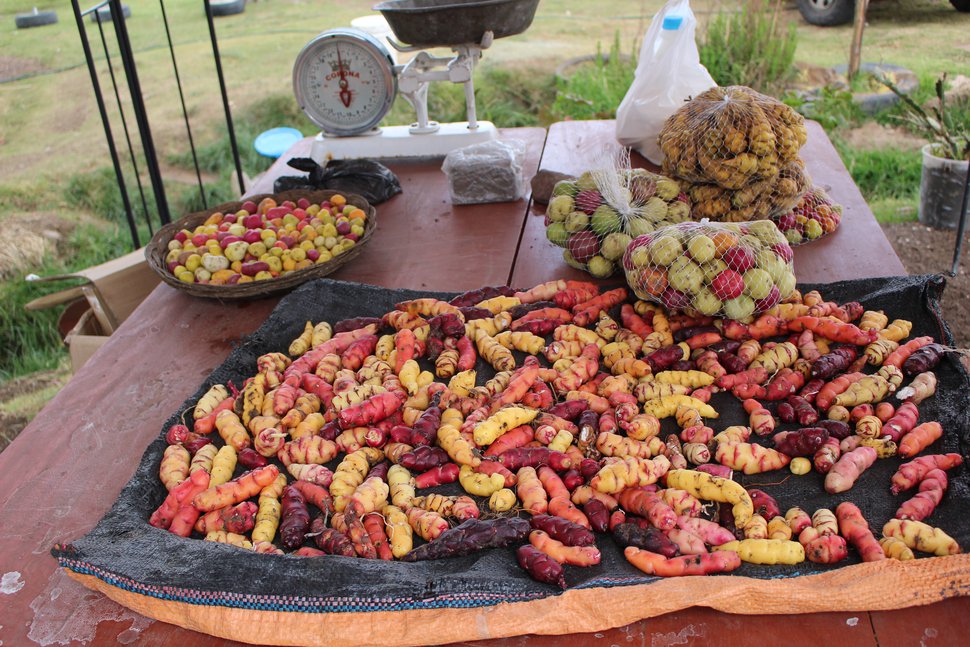Opinion
Church groups call for ‘game-changing’ Food Summit
The UN-led Food Systems Summit on 23 September is calling for “game-changing solutions.” Any such solutions must focus on small-scale food producers and climate resilient agroecology.
Photo: IFAD / Back to the Roots Peru
Small-scale agriculture is the main livelihood for 70 per cent of the world’s poorest people. More than 800 million people are experiencing severe food insecurity caused by a dangerous cocktail of climate change, conflicts, and worsening inequality. The needs, capacities, practices, and knowledge of local actors must be included in decision making related to food systems. Moreover, since food production constitutes one of the most significant drivers of global biodiversity loss, the transformation to agroecology will be key to helping small-scale producers escape poverty and hunger, as well as to reducing emissions and increasing the resilience and quality of food production.
While many with a stake in the 2021 Food Systems Summit have been optimistic about the opportunity to address the multi-faceted challenges, hundreds of scientists, civil society, non-governmental and farmer organisations have boycotted the event. This has brought heavy scrutiny of an imbalance in the summit in favour of commercially-driven, export-oriented interests. There is also a fear that existing mechanisms for evidenced-based policy formulation and civil society representation are being replaced.
The Nordic church organisations – DanChurchAid, Norwegian Church Aid, Finn Church Aid and Act Church of Sweden - and Christian Aid will engage with the governments, companies, and organisations participating in the summit ensuring that local perspectives are given a central focus.
For a summit that seeks to rebalance food systems so that they respond to the needs of the world’s poorest and address multiple global crises, we see three avenues for action:
Seek three wins: food, climate, and agriculture transformation
Truly sustainable food systems provide nutrition, livelihoods, and environmental protection. Ecosystems remind us that all components are interlinked. The summit should take into account the complex natural and political dimensions of food systems. We must create a framework that rewards restoration and enhancement of agricultural and natural resources and food systems that grant everyone access to adequate food.
Most importantly, these approaches must involve and engage individuals and communities: sustainability starts from the ground. Hence, the Food Systems Summit and other relevant processes should be focused on initiating a global transformation to climate-resilient agriculture, including ecosystem services and nature-based solutions, and renewable energy.
Address imbalances in food systems
The pandemic has highlighted the immense resilience and self-reliance of local traditional and biocultural food systems. Local actors have maintained and strengthened these systems throughout the crisis. Responding to climate change and unsustainable food systems, small-scale producers have developed their own strategies of caring for the environment, conserving biodiversity, food-producing habitats and natural water systems. These findings are echoed in a UN report that found organic and near-organic methods and technologies in Africa not only delivered higher increases per hectare of food crops but were also more suitable for vulnerable, marginalised small-scale farmers.
By investing in sustainable and fair food systems that build on local strategies we are not only enabling small-scale producers to escape poverty, but we are also encouraging a whole systems approach that is more resistant to stress. Hence, financial, technical, and social resources should be reallocated to local levels to augment small-scale producers’ contributions to diverse food production and climate change adaptation and mitigation. Furthermore, realizing the potential of small and medium entrepreneurs to come up with innovative and sustainable food systems solutions, a fair and regulated business environment is needed that offers incentives to achieve positive impacts.
Empowering women and girls' role in food systems and promoting women’s legal rights to land, inputs, knowledge, and decision-making structures have a documented transformative effect. There is an urgent need to ensure that gender equality and equal opportunities are considered in the whole value chain from production to consumption. This aligns with the UN’s outline for an inclusive path in the 2030 agenda: “All countries and all stakeholders…are determined to take the bold and transformative steps which are urgently needed to shift the world onto a sustainable and resilient path. They seek to realize the human rights of all and to achieve gender equality and the empowerment of all women and girls.”
Reform the subsidy system
US 700 billion are spent annually on agricultural subsidies but less than 15 per cent of this goes to helping farmers transition to sustainable farming systems. Ecosystem services and nature-based solutions can be a powerful tool in the transformation to agroecology. Subsidies must be re-oriented to stimulate sustainable agricultural and climate adaptive practices. National subsidy priorities should be used to redirect investments in climate resilient agriculture to benefit small-scale producers to become custodians of the natural resource base. This is key for a system transformation approach.
European governments and the EU Common Agricultural Policy could do much more to make agricultural policies a game changer for food systems. Agricultural investments in agroecology by EU governments and the Green Climate Fund remain limited. We encourage all stakeholders in food systems to be the agents of change that they are calling for at the Food Systems Summit and to support transformative change toward more investments in sustainable climate resilient agriculture, in inclusive and human rights-based approaches, and in production systems that do not degrade ecosystems.
____________________________________________________
DanChurchAid – Birgitte Qvist-Sørensen, Secretary General
Finn Church Aid - Jouni Hemberg, Executive Director
Act Church of Sweden - Erik Lysén, Director
Norwegian Church Aid – Dagfinn Høybråten, Secretary General
Christian Aid – Amanda Mukwashi, Chief Executive Officer

